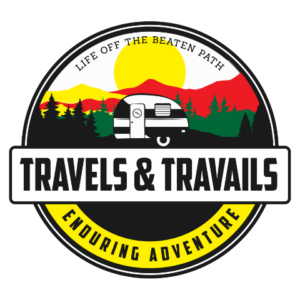Ah, the open road. It’s so alluring, but what happens when you crave a change of pace? It will happen if you’ve camped out in an RV or trailer long enough.
You might begin to feel an itch for what goes beyond the open road, along those paths less traversed. However, you have serious reservations about off-roading in your camper and want to be sure it’s capable first.
You’ve come to the right place!
So, can campers go off-roading? Many types of campers and motorhomes are suitable for off-roading, such as truck campers, off-road trailers, and Class A, B and C RVs (some models, anyway). The key to safely overlanding is to always take it slow. A road might not look treacherous but looks can be deceiving.
I’m sure you have more questions about off-roading in a camper. I’m here to share my personal experiences, including my victories and defeats, so you can enjoy more wins and avoid the mistakes I made.
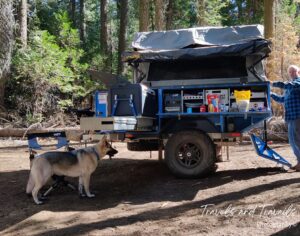
Can You Take Your Camper Off-Road?
Yes, you can, and you should!
I’ll talk a little bit later about the benefits of overlanding, but they’re more than plentiful enough. Even if you decide you don’t like it, which can happen, at least you can say you did it.
Plus, you’ll always have a cool story for your friends and fellow camping buddies!
The Best Types of Campers for Off-Roading
As much as I advocate for off-road camping, I’ll be the first to tell you that not every type of camper or motorhome is suited for these plans.
Your vehicle must meet these criteria:
- Weatherproof: When you’re overlanding, you don’t get much if any protection from the elements. You need a trailer than can withstand the weather without showing any ill effects. It needs airtight seals, corners, and crevices, with closable vents and other openings to prevent water and wind from getting in.
- Maneuverable: The lighter and smaller your vehicle, the easier it is to maneuver, which is why trailers and smaller RVs are such an excellent choice for off-roading. You can face some treacherous conditions off the beaten path, so maneuverability is a must.
- Heavy-duty construction: Overland campers are simply built differently. They have rugged bodies with frame reinforcement designed to withstand the toughest conditions without buckling, allowing you to get deeper into the woods or further along that dusty trail.
- Off-road tires: You can’t use traditional RV tires when you go overlanding. Instead, you need tires appropriate for the job, such as off-road tires. These wheels can weather tougher terrain without popping and drawing a flat. They also provide better traction off traditional roads.
- Four-wheel drive: RVs and trailers can have four-wheel drive, and overland models will. This dual-axle drivetrain system is for off-roading and towing, so it’s doubly pertinent a trailer has this feature.
- Ground clearance: With all the dust and dirt you can kick up while off the road, your camper must have more ground clearance than usual. This will protect its sensitive underbelly from damage.
Many of your favorite RV manufacturers produce off-roading campers and RVs, from Jayco to Rockwood, Winnebago, and Thor.
Here are the types of motorhomes and trailers you should look for as you start your search.
Off-Road Trailers
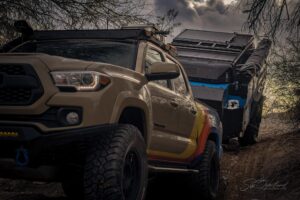
These vehicles are designed for the overlanding experience. They check every one of the boxes above and are capable of crossing into the deepest terrain that you’d never dream of taking your traditional trailer or RV.
However, the only downside of these vehicles is that driving them on standard terrain feels like a waste. They can handle it with aplomb, but they’re built for so much more.
Class A Motorhomes
Only select Class A motorhomes, which are recommended for off-roading. Since this is the largest RV class, and larger vehicles are not commensurate with maneuverability, purchase a Class A off-roader.
It will feature an even sturdier build than a standard Class A. Due to these additional features, the price can be more than a typical motorhome in this class.
Class B Motorhomes
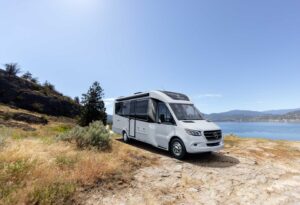
A Class B RV is a great choice for off-roading, but again, it all depends on the model. You’d drive a Class B rather than tow it, but they’re much smaller than Class A and C motorhomes, giving you more maneuverability.
Better yet, many Class Bs use a truck or van chassis, increasing the chances of the vehicle having four-wheel drive for safer navigation on various terrain.
Class C Motorhomes
Of the three classes, an off-road Class C motorhome is in the middle size range. It is another strong choice as you explore your options. Some Class Cs double as tow vehicles, so you could hitch an off-road trailer to your Class C and hit the open road.
If you’d rather cut down on the bulk, you can always drive a Class C as it is. It’s larger than a Class B but still very much maneuverable.
Truck Campers
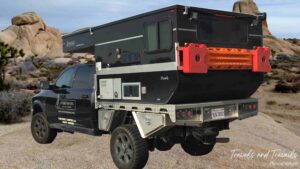
The last vehicle category I recommend for overlanding is truck campers. Most are pop-ups, and although reinforced, you shouldn’t be a beginner camper if you choose this type of vehicle for your off-road adventures. Ensure the truck camper has four-wheel drive.
The Benefits of Off-Roading
Now that you know the basics, I want to take the remainder of this article to share my favorite parts (and the not-so-glamorous aspects) of overlanding in a camper, along with my top tips for a safe, enjoyable experience.
Okay, so let’s get underway with what I love best about off-roading in a camper.
In this article, find out if off-road camping is for you.
Adds Novelty Back to the Experience
As I mentioned before, when you camp as often as I do, after a while, even visiting your favorite national parks and campsites gets a bit…you see, I hesitate to say boring, because it’s never that. I guess the word is expected.
You have a general idea of what you will see and do when you visit. That familiarity is nice, like a warm blanket, but if you’re like me and always yearning to do something new, the familiarity can feel a bit stifling after a while.
Off-roading allows you to enjoy the novelty of camping again. It’s like seeing it through the eyes of someone RVing for the first time, except without all the inexperience.
Allows You to Explore New Places
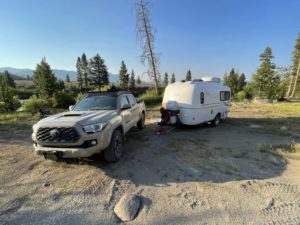
There’s a whole wide world out there. How much of it have you seen?
You might have visited all the major RV resorts, campsites, and parks, but until you’ve gone overlanding in a camper, you’d be surprised by how little you’ve truly seen.
I felt shocked at all the untamed wilderness around me to explore. It made me realize how vast this big globe is and how much more I wanted to experience.
Off-roading was my ticket to doing that, and I’ve since happily expanded my repertoire.
Tests Your Abilities
Camping at a park where you have all your electrical, water, and sewer hookups available is great, don’t get me wrong. However, where’s the challenge? What new skills will you foster?
If you’re willing to push yourself outside your comfort zone, you will find many opportunities to see what you can do when you go off-road.
And no, it’s not solely about the brownie points or the self-esteem boost. You’re learning real survival skills.
You’ll have to master pitching a tent, lighting a fire, navigating untamed trails in your camper, using a compass, and reading a map.
Goodness forbid you’re ever in a dangerous situation, and you’ll be glad you have these skills.
And even if you stay generally safe, then yes, you have those brownie points.
Makes You Disconnect
How often do we say we’re going to disconnect, only to pick up our phone because we got a notification, then sinking an hour or more into looking at it? We’ve all done it.
I know I’m especially guilty of it.
Before you know it, your staycation turns into a work-cation. Oops.
When you off-road, you’re far removed from the nearest campground, which means your chances of having access to internet connectivity are slimmer than ever.
Even if you can find a connection, you won’t want to use your phone long. You’re boondocking out there, and you need to save the battery for an emergency.
Sets the Stage for Great Memories
Since everyone will finally put the phones down and make some eye contact, you will partake in memories you’ll all remember and cherish. I haven’t felt as close to my husband as I did when we started off-roading together in our camper.
We had no internet, no emails, no social media, no videos or news headlines to distract us. It was just him and I, giving us a chance to reconnect in a way we wouldn’t in any other scenario.
The Risks of Off-Roading
I promised I would give you both sides of the coin of overland camping, and that’s precisely what I’m going to do. Without further ado, here are some issues I’ve experienced when camping in the middle of nowhere that might make you rethink your approach.
It’s Easy to Get Lost
You can’t reliably use a GPS when off-roading, and you don’t always have natural markers to indicate where you are. That makes it scary and easy to get lost, especially if you’re not so great at reading maps or compasses (or somehow have neither).
Getting lost in the middle of nowhere can be scary. When it happened to me, I panicked. Then I realized that wouldn’t help me, so I took a deep breath, calmed myself down, and figured out what I could do.
I got out of the situation with some wayfinding, but if you don’t yet have those skills, you must have an emergency phone so you can call for help.
It Can Be Boring
Imagine driving for hours in tough conditions to reach a point that’s not exactly what you thought. Or, worse yet, it’s exactly what you pictured, but not as good as you had thought it would be.
The open wilderness is fun for playing and exploring, but sometimes, there’s not much to it.
You Must Pack the Right Amount of Supplies
How many supplies do you need for overlanding? It can be a gamble, especially the first time you do it or when you add more passengers than you’re used to.
If you overpack, you must distribute your vehicle’s weight, which gives you another headache. However, if you under-pack, you’ll be short on something you need, which is much worse, especially if we’re talking about food (which, hopefully, we aren’t!).
Packing precisely the right amount takes time, but the inconvenience of not having something you need can put a damper on your trip at best and put you in danger at worst.
Showering Is Tough
You’re already used to not showering daily when camping, but it could become even more seldom still when overlanding.
The most plentiful resource you might have available for staying clean is a lake or river. I recommend using those bodies of water, especially if camping with others in close quarters.
It’s the respectful thing to do!
You’re Encroaching on Wildlife
Once you get deeper into the wilderness, you risk getting caught in a nasty swarm of wasps or upsetting a mama bear. Awareness of your surroundings at all times will minimize these hazards. You should also know how to handle a wild animal encounter, as sometimes you should back away, and other times, play dead.
My Top Off-Roading Tips
Is it time to go overlanding? If you answered yes, check out this collection of tips sure to help you successfully plan your first time out.
Choose Your Locations Carefully
While it seems fun to go deep into the wilderness, maybe save that until you have a wee bit more experience under your belt. Go somewhere more accessible but still remote for your first off-roading adventure.
That will make it harder to get lost and easier to find your way back if you somehow get off-route.
Reduce Your Tire Pressure
Whether driving a motorhome or pulling a trailer, lower your tire pressure. It will help your vehicle navigate rockier terrain more easily and reduce the jittering and bumping you can feel with every stone.
Use Satellite Maps
Satellite maps are accurate, perhaps more so than paper maps (although it never hurts to compare the two and be sure). You should consult a satellite map before venturing out to ensure the place you want to stay a.) exists and b.) is in camp-able condition.
Bring a Spare Emergency Phone
I want to reiterate the importance of using a secondary phone just for emergencies. Whether you’re injured, sick, or a fire starts in or around your vehicle, you’ll be glad you can contact 911 (or your emergency number equivalent) even when out in the middle of nowhere.
Consider a Satelite Communication Device
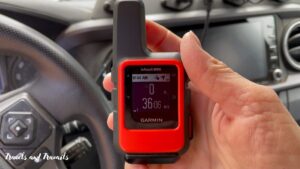
There are several satellite communication devices on the market. My husband and I have the Garmin inReach Mini. Since we bought it, Garmin has upgraded the device to the inReach Mini 2.
I love that it is lightweight and portable but has that essential SOS function you need in an emergency. You can also use it to share your location with friends and family.
Don’t Rush
There’s no need to travel quickly when overlanding. You never know what could be over that hump or around the corner, and finding out the hard way can lead to flats, fender benders, and other vehicular damage.
Take your time, drink in the scenery, and take some time to smell the figurative roses. That’s why you’re off-roading in the first place, to reunite with nature. Let it happen at nature’s own pace.
Wrapping Up
Campers and RVs can off-road, known as overlanding, but they must be made for the rigors of the experience. Your vehicle must have a sturdy body, off-road tires, ground clearance, and four-wheel drive.
Although overlanding has its challenges, it’s such a blast. You can truly disconnect and inject some life back into your camping experiences with your favorite people. I couldn’t recommend it enough!
